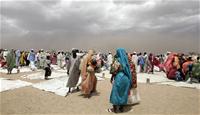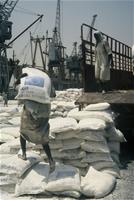Sudan inside
Evelyna Topalova, January 12, 2011
 When asked about Africa, some people will associate it with wild animals, desert, music or football. The first thing that would pop up in other people's minds could be poverty, starvation and wars. Bulgarian media hardly ever cover Africa as the focus is put on Europe and North America. In the past several months, South America was also drawing media attention after Brazil got a president with Bulgarian origin.
When asked about Africa, some people will associate it with wild animals, desert, music or football. The first thing that would pop up in other people's minds could be poverty, starvation and wars. Bulgarian media hardly ever cover Africa as the focus is put on Europe and North America. In the past several months, South America was also drawing media attention after Brazil got a president with Bulgarian origin.
The reason for me to focus in this article on Africa and namely on the largest country on the continent - Sudan is not the appointment of a politician with Bulgarian ancestors to a senior position but a referendum that could clear the way for the creation of the newest country in the world.
Sudan has been a scene of religious and inter ethnic conflict for years. While the North is Arab-and-Muslim, the South is African-and-Christian. The independence referendum was envisaged in the 2005 peace agreement which ended the two decades-long civil war between the North and the South and which claimed the lives of two million people.
In a week-long period until January 15th the people of South Sudan will be able to give their say on the initiative on the region's secession and its proclamation as a new state. The vote is undergoing under extremely high turnout but is marred by violence.
The turnout should pass the 60-percent threshold of the registered 3.9mn voters for the vote to be declared valid. If the referendum succeeds, the new state will be proclaimed on July 9th 2011, six years after conclusion of the peace agreement.
Before South Sudan gets Khartoum's blessing for its secession, the two sides must find a solution to several key issues.
Is it all about oil?
The economy of Sudan relies mainly on oil exports. The country rose its oil production to 500 000 barrels per day. Most of the oil is located in the south but the pipelines run through the north to the sea. Thus the two parts are economically interconnected and will have to decide how to share oil revenues.
Other issues are related to water rights on the White Nile, citizenship and border demarcation, which is essential for cattle-herding tribes. Sudan's debt that amounts at $38 billion will also be a subject of heated discussions.
The status of the oil-rich disputed border enclave Abyei also remains unresolved. It had been promised a self-determination vote, but its fate will most likely be  decided in further negotiations.
decided in further negotiations.
Sudan's President Omar Al-Bashir (who was charged by the International Criminal Court with genocide committed in the western province of Darfur) reassured that he will accept the results from the referendum. The fears that the North will try to thwart the referendum and provoke a new conflict turned out to be groundless so far.
A peaceful divorce would be the best and painless solution for the two sides after years of bloodshed. Memories from the conflict in Darfur, which provoked concern among the international community and the EU, are still fresh. About 300,000 people have died since the beginning of the conflict in 2003 between rebels in the western province and the government. Some 2.7mn people have fled their homes, according to data by the UN. In December Brussels announced it would allocate 17mn euros in humanitarian aid for Sudan ahead of the referendum, thus bringing the EU funds for Darfur and South Sudan to a total of 131mn euros for 2010. Sudan is the European Commission's largest beneficiary of humanitarian aid.